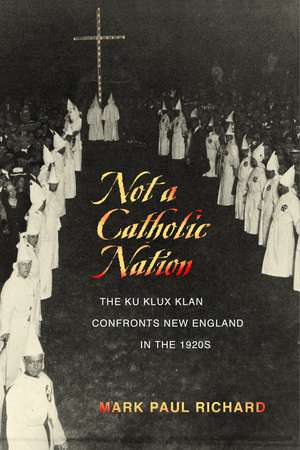Not a Catholic Nation: The Ku Klux Klan Confronts New England in the 1920s
Autor Mark Paul Richarden Limba Engleză Paperback – 12 noi 2015
During the 1920s the Ku Klux Klan experienced a remarkable resurgence, drawing millions of American men and women into its ranks. In Not a Catholic Nation, Mark Paul Richard examines the KKK's largely ignored growth in the six states of New England—Connecticut, Maine, Massachusetts, New Hampshire, Rhode Island, and Vermont—and details the reactions of the region's Catholic population, the Klan's primary targets.
Drawing on a wide range of previously untapped sources—French-language newspapers in the New England–Canadian borderlands; KKK documents scattered in local, university, and Catholic repositories; and previously undiscovered copies of the Maine Klansmen—Richard demonstrates that the Klan was far more active in the Northeast than previously thought. He also challenges the increasingly prevalent view that the Ku Klux Klan became a mass movement during this period largely because it functioned as a social, fraternal, or civic organization for many Protestants. While Richard concedes that some Protestants in New England may have joined the KKK for those reasons, he shows that the politics of ethnicity and labor played a more significant role in the Klan's growth in the region.
The most comprehensive analysis of the Ku Klux Klan's antagonism toward Catholics in the 1920s, this book is also distinctive in its consideration of the history of the Canada–U.S. borderlands, particularly the role of Canadian immigrants as both proponents and victims of the Klan movement in the United States.
Drawing on a wide range of previously untapped sources—French-language newspapers in the New England–Canadian borderlands; KKK documents scattered in local, university, and Catholic repositories; and previously undiscovered copies of the Maine Klansmen—Richard demonstrates that the Klan was far more active in the Northeast than previously thought. He also challenges the increasingly prevalent view that the Ku Klux Klan became a mass movement during this period largely because it functioned as a social, fraternal, or civic organization for many Protestants. While Richard concedes that some Protestants in New England may have joined the KKK for those reasons, he shows that the politics of ethnicity and labor played a more significant role in the Klan's growth in the region.
The most comprehensive analysis of the Ku Klux Klan's antagonism toward Catholics in the 1920s, this book is also distinctive in its consideration of the history of the Canada–U.S. borderlands, particularly the role of Canadian immigrants as both proponents and victims of the Klan movement in the United States.
Preț: 225.14 lei
Nou
Puncte Express: 338
Preț estimativ în valută:
43.09€ • 44.93$ • 35.81£
43.09€ • 44.93$ • 35.81£
Carte indisponibilă temporar
Doresc să fiu notificat când acest titlu va fi disponibil:
Se trimite...
Preluare comenzi: 021 569.72.76
Specificații
ISBN-13: 9781625341891
ISBN-10: 162534189X
Pagini: 278
Ilustrații: 8 b&w illus.
Dimensiuni: 156 x 235 x 23 mm
Greutate: 0.48 kg
Ediția:First Edition
Editura: University of Massachusetts Press
Colecția University of Massachusetts Press
ISBN-10: 162534189X
Pagini: 278
Ilustrații: 8 b&w illus.
Dimensiuni: 156 x 235 x 23 mm
Greutate: 0.48 kg
Ediția:First Edition
Editura: University of Massachusetts Press
Colecția University of Massachusetts Press
Notă biografică
Mark Paul Richard is professor of history and Canadian studies, State University of New York at Plattsburgh. He is author of Loyal but French: The Negotiation of Identity by French-Canadian Descendants in the United States.
Recenzii
"Not a Catholic Nation is both original and illuminated by some of the most creative approaches found in recent scholarship in U.S. Catholic history. By opening with an account of the Klan's activities in the state featuring the most extensive boundary with Canada, Richard engages early the trans-national dimension of his story, a major feature of religious and ethnic conflict in the United States but one which has rarely been examined so intimately."—James T. Fisher, author of Communion of Immigrants: A History of Catholics in America
"Not a Catholic Nation adds to Richard's distinguished record of scholarship in interethnic relations and acculturation. Crucially, it also adds much-needed emphasis on Americans of French Canadian descent, for whom researchers have shown too little interest in the last two decades."—H-Net Reviews
"Not a Catholic Nation sheds light on the workings of New England's immigrant cultures and nativist politics. Recommended."—Choice
"Richard impressively outlines the spread of the Klan in New England. Equally important, he situates Klan ideas and initiatives in a broader Americanization movement led by Yankee Protestants that began before the 1920s. Significantly, Richard also focuses on the anti-Klan movement that featured political, economic, and grassroots resistance to the hooded society."—Journal of American History
"Not a Catholic Nation adds to Richard's distinguished record of scholarship in interethnic relations and acculturation. Crucially, it also adds much-needed emphasis on Americans of French Canadian descent, for whom researchers have shown too little interest in the last two decades."—H-Net Reviews
"Not a Catholic Nation sheds light on the workings of New England's immigrant cultures and nativist politics. Recommended."—Choice
"Richard impressively outlines the spread of the Klan in New England. Equally important, he situates Klan ideas and initiatives in a broader Americanization movement led by Yankee Protestants that began before the 1920s. Significantly, Richard also focuses on the anti-Klan movement that featured political, economic, and grassroots resistance to the hooded society."—Journal of American History
